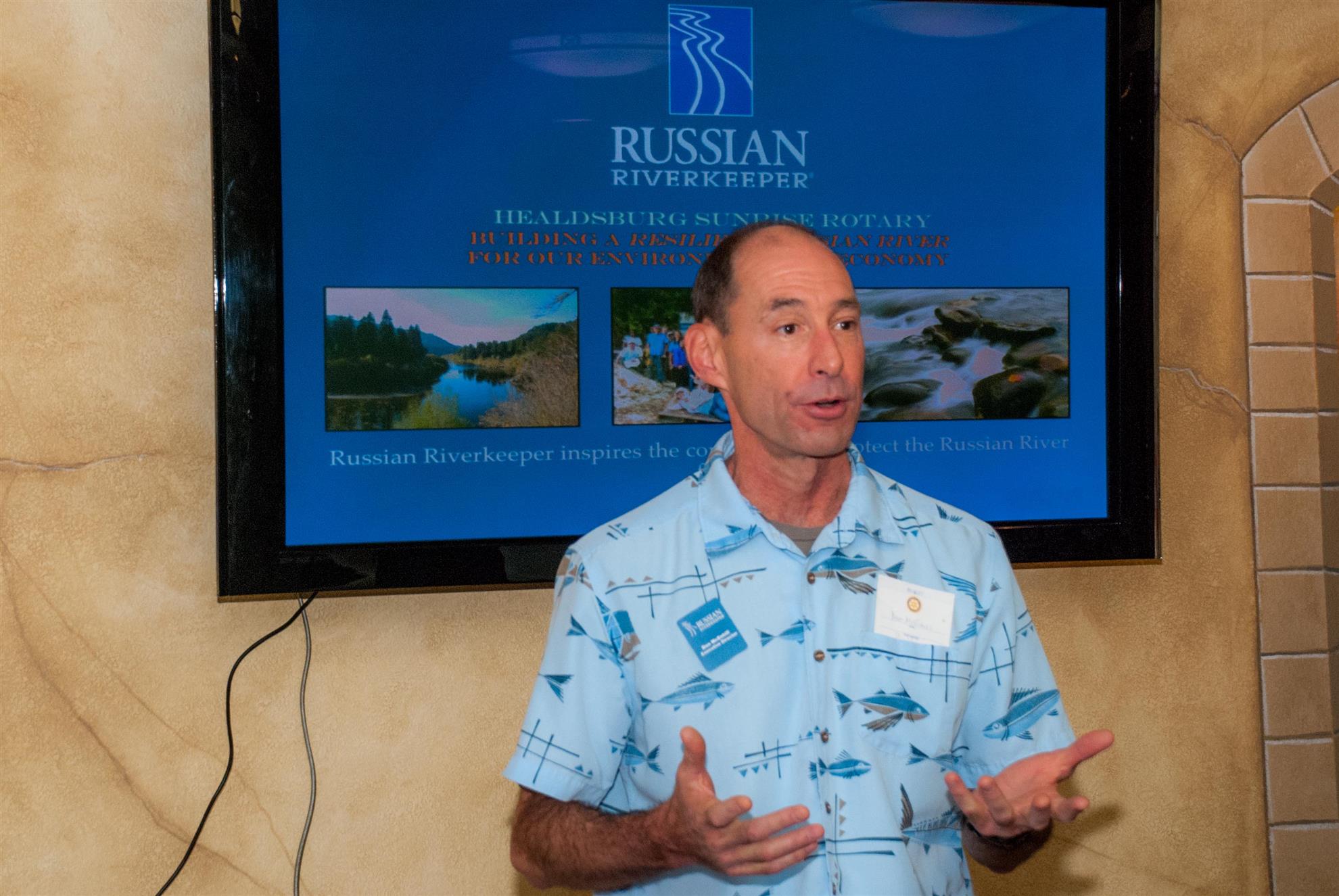Russian River Keeper Association - Don McEnhill
Don McEnhill from the Russian River Water Keeper Association presented an overview of water and its central role in the economy and quality of life in Sonoma County.

Don McEnhill from the Russian River Water Keeper Association presented an overview of water and its central role in the economy and quality of life in Sonoma County. He tied this with climate change and left the group with the message that we need to do all we can NOW to both conserve our water and find ways of reclaiming the water that we have used as well as the water that is increasingly flowing through the Russian River to the ocean without recharging the aquifers.
The Russian River Keeper organization is locally funded. They are members of the International Water Keeper Association and the California Coast Water Keeper Association. The Russian River is essential for the future water supply of Sonoma County. As such, the Russian River waterway is one of the most important community assets that we have. Nine out of 10 jobs require water in Sonoma County. The River and its tributaries support a very diverse collection of plants and animals that form one of the tourism draws to our area. The river also adds to our quality of life with recreation, fishing, canoeing, swimming, and joyful vacations.
Water is increasingly a worldwide problem that is aggravated by climate change. In developed countries, much of the groundwater is being channeled off without an opportunity to soak into the ground as we pave over more and more areas. The increased storm sewage that enters the rivers and tributaries increases the rate of flow of the river leading to increased erosion and dropping of the riverbed, which in turn drops the level of the water table. With the rapid flow of water comes an increased risk of flooding.
In the middle reach of the Russian River alone, an area stretching from just south of Dry Creek to Wohler Bridge there has been a loss of nearly 2,300 acres of catchment area in the past 30 years. If this land were available for overflow of the river, it could recharge the aquifer with as much water as is drawn from Lake Sonoma on a regular basis. It would also provide habitat for salmon and steelhead as well as other creatures living in a riparian environment.
Economic analysis shows that the economic consequences of flooding are equal to or greater than the economic consequences of droughts or earthquakes. We are likely to have more floods as climate change brings about less frequent storms, but storms that are much more powerful than they have been in the past which will lead to much higher rates of runoff and movement of water. With hotter temperatures and less steady rain, vegetation will tend to be drier and fires more likely to occur and to burn hotter increasing damage to the environment.
He suggested 4 strategies to help solve our problems with inadequate amounts of water on a steady basis:
We need to prioritize water conservation. Even though we may have good rains and storage capacity, the population of California is likely to increase by another 20-30% in the next 30 years, and we do not have enough water capacity even in good years with our present system to sustain that population.
We need to develop programs to increase groundwater recharging. This involves slowing down the river by widening channels and developing catchment basins to take water at times of peak flow. Not only would this recharge the aquifers but would also stop downstream erosion.
We need to stop polluting the water by taking all of our industrial and commercial as well as yard waste products off the street where they run into our storm sewers and instead dispose of them properly.
We need to conserve what riparian areas currently exist as well as expand the area for riparian growth. Increased riparian areas lead to a richer nutrient supply for wildlife and as a consequence healthier populations of fish and riparian mammals.
Already Healdsburg High School, Cloverdale High School and El Mulino High School are participating in the Clean Campus/Clean Creeks in which they build rain gardens on their campuses and at their homes along with bio-swales to prevent water from reaching storm sewers and to percolate downward into the ground for aquifer recharging. New real estate developments in the county are being encouraged to develop along these lines as well.
The possibilities exist for adequate water supplies to be present in Sonoma County with just a few simple steps to be taken over the next 10-15 years. Now is the time to start this process.
Don closed with a quote:
Our memory is incredibly short. We’re busy people. We have busy lives. We have so many distractions. It is so easy to forget two or three years from now the drought we are in today.
More information is available at russianriverkeeper.org. Don can be reached at don@russianriverkeeper.org.